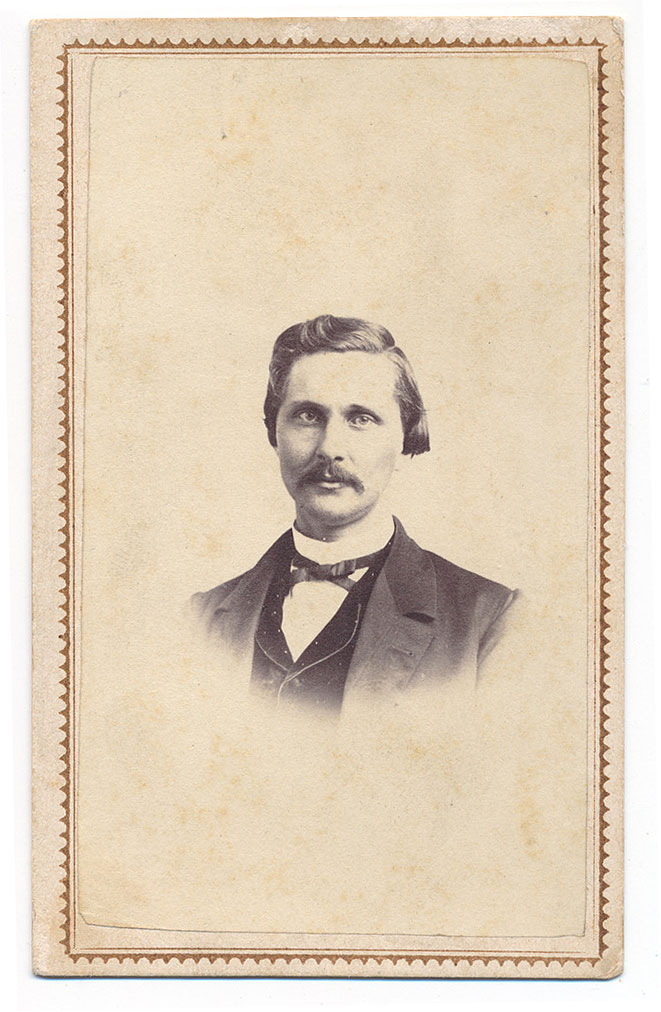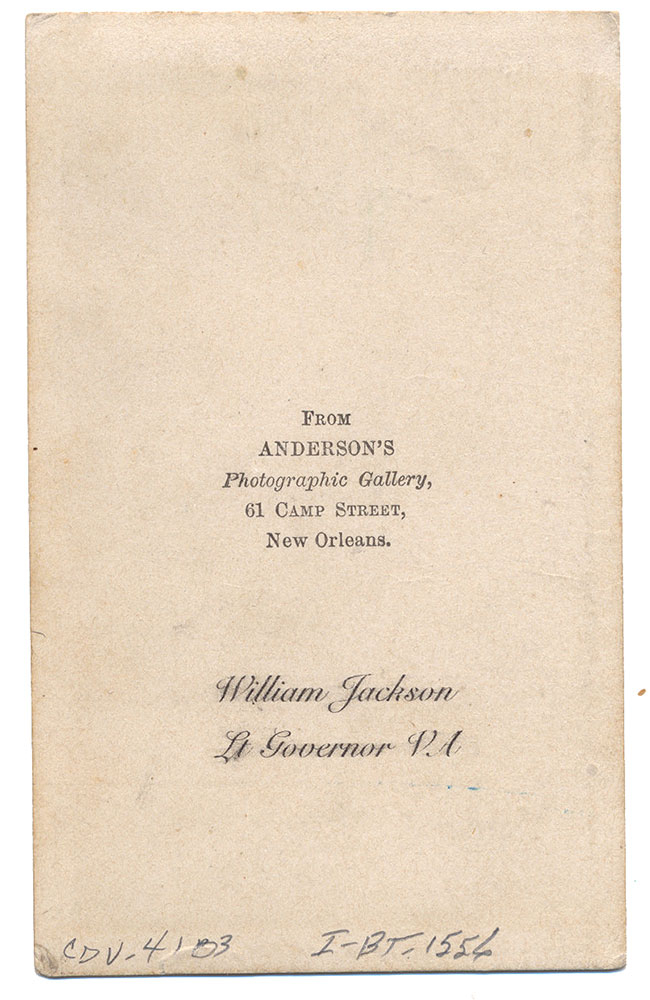site search
online catalog
CDV OF WILLIAM L. JACKSON, LT. GOVERNOR OF VIRGINIA & C.S. GENERAL

Hover to zoom


$225.00 SOLD
Quantity Available: None
Item Code: 1138-1556
Bust view of Jackson. Image is clear with very good contrast. Mount is clean with nice scalloped frame around image. Photographer's backmark, Anderson's, New Orleans. Printed identification also on back.
William Lowther Jackson Jr. (February 3, 1825 – March 26, 1890) was an Virginia lawyer, Democratic politician, slaveholder and jurist who became the Lieutenant Governor of Virginia prior to the American Civil War, and later fought in the Confederate States Army, rising from his initial rank of private to General.
Jackson became Virginia's Second Auditor, as well as superintendent of the state library fund. In 1857, Jackson won his first statewide elective office, becoming Virginia's third Lieutenant Governor. In that capacity he served as President of the Virginia Senate from 1857 until 1860 (during the Assemblies of 1857-1859 and 1859-1861).
When Virginia seceded from the Union, Jackson enlisted in the Confederate States Army as a Private. Recommended to General Robert E. Lee, he quickly became an officer, then Lieutenant Colonel of the 31st Virginia Infantry Regiment. Assigned to the command of Gen. Robert S. Garnett, he participated in the Western Virginia Campaign and the battles of Rich Mountain and Cheat Mountain. In July 1861 he was promoted to rank of Colonel. In early 1862 he became a Volunteer Aide-de-camp to his cousin, Maj. Gen. Thomas J. Jackson; and participated in his campaigns during the year.
In February 1863, as West Virginia's constitutional convention adopted a new constitution with the provision abolishing slavery demanded by the U.S. Congress, Confederate authorities authorized William Jackson to organize a mounted regiment for service behind enemy lines. He thus recruited the 19th Virginia Cavalry, which immediately joined the Jones-Imboden Raid. Jackson stayed in western Virginia, promoted to command a cavalry brigade. He fought at the Bulltown and confronted Union Gen. George Crook returning into West Virginia following Crook's victory at the Battle of Cloyd's Mountain. In 1864 Jackson joined Lt. Gen. Jubal Early in the Valley Campaigns from May to October. He received his promotion to brigadier general on December 19, 1864.
On April 15, 1865, six days after Gen. Lee surrendered the Army of Northern Virginia at Appomattox Court House, Jackson disbanded his brigade. Refusing to surrender, however, he headed westwards, finally receiving a parole in Brownsville, Texas, on July 26, 1865.
Temporarily emigrating to Mexico, Jackson returned to what was now West Virginia, then learned that the new state barred former Confederate officers from practicing law in the state. He then moved to Louisville, Kentucky, where he was allowed to resume his law practice. Jackson became a circuit judge again and kept this position for his remaining life.
He died on March 26, 1890 of Bright's disease in Louisville; and was interred there on Cave Hill Cemetery.
This image was from the collection of the late William A. Turner. [jet] [ph:L]
~~~~~~~~~~~~~~~~~~~~~~~~~~~~~~~~~~~
THIS ITEM, AS WITH ALL OTHER ITEMS AVAILABLE ON OUR WEB SITE,
MAY BE PURCHASED THROUGH OUR LAYAWAY PROGRAM.
CLICK HERE FOR OUR POLICIES AND TERMS.
THANK YOU!
Inquire About CDV OF WILLIAM L. JACKSON, LT. GOVERNOR OF VIRGINIA & C.S. GENERAL
Most Popular
Historical Firearms Stolen From The National Civil War Museum In Harrisburg, Pa »
Theft From Gravesite Of Gen. John Reynolds »
Selection Of Unframed Prints By Don Troiani »
Fine Condition Brass Infantry Bugle Insignia »
featured item
A FINE EXAMPLE OF A CONFEDERATE INFANTRYMAN'S KEPI
This cap's crown, top and base band are made from a medium weight open weave woolen fabric which may be a blend of sorts. It certainly looks "home spun". The kepi gives indications of being a depot made item but may actually have been homemade as… (1268-037). Learn More »


